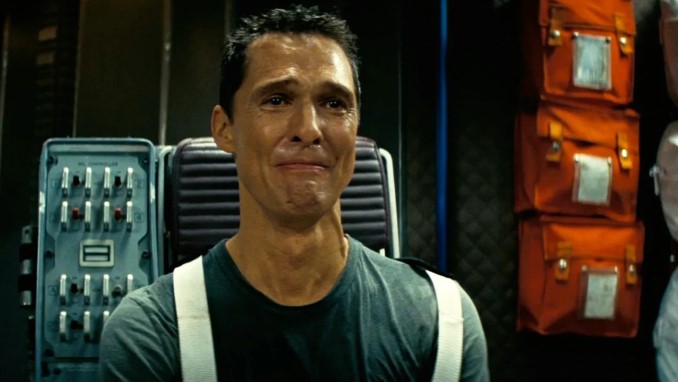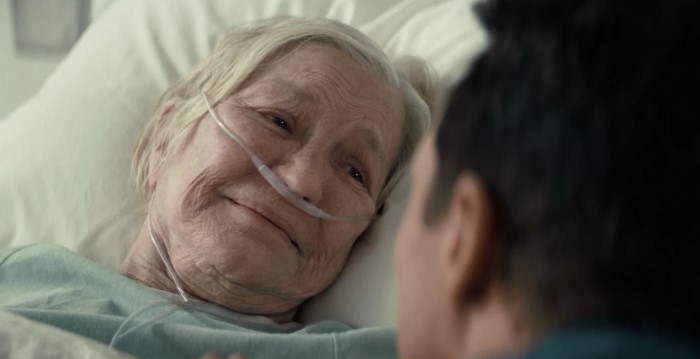Interstellar at 10: Christopher Nolan’s Heartbreaking Ode to Fatherhood

In the ten years since Interstellar was released in cinemas, Christopher Nolan has cemented himself as a champion of the big screen. At the time of its release, Interstellar was easily his most ambitious film to date; more IMAX cameras were used to shoot the film than in any of Nolan’s previous work, and the result is a breathtaking science fiction adventure that traverses entire galaxies. The most memorable aspect of this film, however, is not its visual spectacle, but rather the tenderness at the heart of its screenplay.
Set in the near future, Interstellar imagines a world in the midst of a climate catastrophe, which admittedly felt like more of a dystopian premise 10 years ago than it does today. With the Earth suffering from extreme cases of blight and famine, and with natural resources depleting, the remaining humans who haven’t died from asphyxiation or starvation are left to find a solution to save humanity. The answer: interstellar space travel to find another planet in another galaxy. Because if we can’t save this planet, we might as well start afresh by colonizing a new one, right?
Interstellar bears all the hallmarks of a classic Nolan film; there’s a mind-bending approach to the laws of time and physics, a plethora of chalk boards covered in complex mathematical equations, and of course, a dead wife. But what sets this film apart is how unabashedly sentimental it is in comparison to Nolan’s previous work. For all its grand ideas about space travel and impending climate disasters, at its core Interstellar is a ghost story about the passage of time and the enduring power of a father’s love in the face of every conceivable—and inconceivable—threat. When faced with the prospect of leaving his children to slowly perish on a dying planet, ex-NASA-pilot-turned-farmer Cooper (Matthew McConaughey) decides to join a team of scientists on a mission to find another habitable planet. Despite the protests of his daughter Murphy (Mackenzie Foy), Cooper leaves Earth with the promise that he will return to his family no matter how long it takes. Driven by this promise and his determination to save his children’s future, Cooper sets off on a journey that takes him across (event) horizons and through black holes.
Though Nolan is notorious for his time-bending and mind-boggling plotting, lying beneath the surface of these films is often a dedicated pursuit of the strength of fatherhood. The role of the father is a specter that haunts the director’s filmography, and his allusions to the sanctity of the family home are hardly subtle or discrete. Most of his protagonists are men fighting their way back to their children to varying degrees of success—in The Prestige, magician Alfred Borden (Christian Bale) rewards himself for defeating his rival by reuniting with his daughter at the end of the film. Similarly, in Inception, Cobb (Leonardo DiCaprio) only allows himself to be reunited with his children after confronting the guilt he feels over his wife’s suicide and allowing himself to grieve her death. For both of these characters, children are a sacred gift to be cherished and not to be taken for granted. But where they are driven by grief or guilt, as is so often the case with a Nolan screenplay, in Interstellar the protagonist is instead driven by the promise he made to return to his daughter.

Nolan’s vision of black holes and vast, desolate planets makes the film mesmerizing to look at, but in the director’s own words Interstellar is more than just another sci-fi blockbuster; it is ultimately about “the sense of your life passing you by and your kids growing up before your eyes.” When an accident means that Cooper spends more than 20 Earth years on another planet, you see the devastation written clearly on his face as he processes what he just missed. The decades that Cooper accidentally spends on this planet are a mistake that he cannot undo, and he returns to find a litany of video messages from his children sent from Earth where they had been waiting for him to respond. He watches his son Tom (first played by a young Timothée Chalamet, then Casey Affleck) grow before his eyes, 23 years condensed into 3 minutes. He watches Tom graduate from school, get married, and unfortunately, lose his first son. It feels like an exaggerated version of how quickly time passes as a parent—one day you’re dropping your kids off for their first day at school, then you blink and suddenly they have a life of their own. Cooper breaks down at the realization of the years lost between them, and when he reaches towards the screen, silently begging his children not to let him go as he sobs uncontrollably, there’s the sense that maybe this was all for nothing. Maybe the complete annihilation of the human race would be worth it, if it meant he got to spend those years with his children.
Buoyed by a determination to claw back whatever time he has left, Cooper travels through the dimensions of time and space, carried each step of the way by the promise he made to return to his daughter all those years ago. The film reaches its emotional peak when he finds himself in a tesseract made up of infinite copies of Murphy’s bedroom, suspended throughout time. He breaks down in tears at the physical manifestation of all the years he missed before realizing that Murphy—and the love she has for him—was the key all along.
Floating in this interdimensional library of his daughter’s life, quite literally trapped in a prison of his own making, Cooper realizes that he can use these moments to send a message to Murphy from across the twin gulfs of time and space. His first is simple: the word “STAY” translated through the use of dust on Murphy’s bedroom floor and binary code, a last-ditch attempt at convincing his past self to remain by his daughter’s side. His second message is more clinical. The data required for Murphy to finally complete the solution needed to save humanity is translated through Morse code on an old watch that Cooper left behind with the promise that when he returned, he and Murphy would compare their relative times. It becomes clear that Cooper was always destined to find his way back to his daughter—as Murphy asserts at the end of the film, she always knew he would come back because “my dad promised me.” It is only decades later, when Murphy is surrounded by children of her own, that she is able to let go of her father once and for all. Lying in a hospital bed surrounded by multiple generations of her family, Murphy recognizes that her father kept his promise and that he belongs among the stars. She grips his hand one last time and tells him, “I have my kids here for me now. You go.”

Christopher Nolan often insists that his films should be watched without him in mind, a direct instruction to separate the art from the artist. But it feels impossible to do this with Interstellar—the film was literally filmed under the title Flora’s Letter, with Flora being the name of Nolan’s only daughter. There’s a moment in the film where Professor Brand (Michael Caine), the director of the space missions, muses that “love is the one thing we’re capable of perceiving that transcends dimensions of time and space.” It is an overwhelmingly sentimental line that captures the entire thesis of the film in a single sentence. Interstellar is an ode to fatherhood dressed up as an elaborate sci-fi disaster movie, and it is one of the most emotionally vulnerable films Nolan has ever made. In the years following, the director would move away from the personal in pursuit of projects that were more detached in their storytelling, and it would take almost 10 years for him to return to ideas about fatherhood in Oppenheimer, where the physicist’s distinct lack of interest in his children is highlighted as one of his many failings (Oppenheimer being shown to embrace of the title of “father of the atomic bomb” while ignoring his actual children on multiple occasions throughout the film was an excellent touch on Nolan’s part). Nolan’s reverence for the role of fatherhood is neither subtle nor discrete, and schmaltzy though the request may be, in Interstellar the director insists we believe in the power of love to save humanity. Looking back from an ever-deteriorating planet in a political moment where it feels like all hope is lost, how could we possibly refuse?
Nadira Begum is a freelance film critic and culture writer based in the UK. To see her talk endlessly about film, TV, and her love of vampires, you can follow her on Twitter (@nadirawrites) or Instagram (@iamnadirabegum).







































